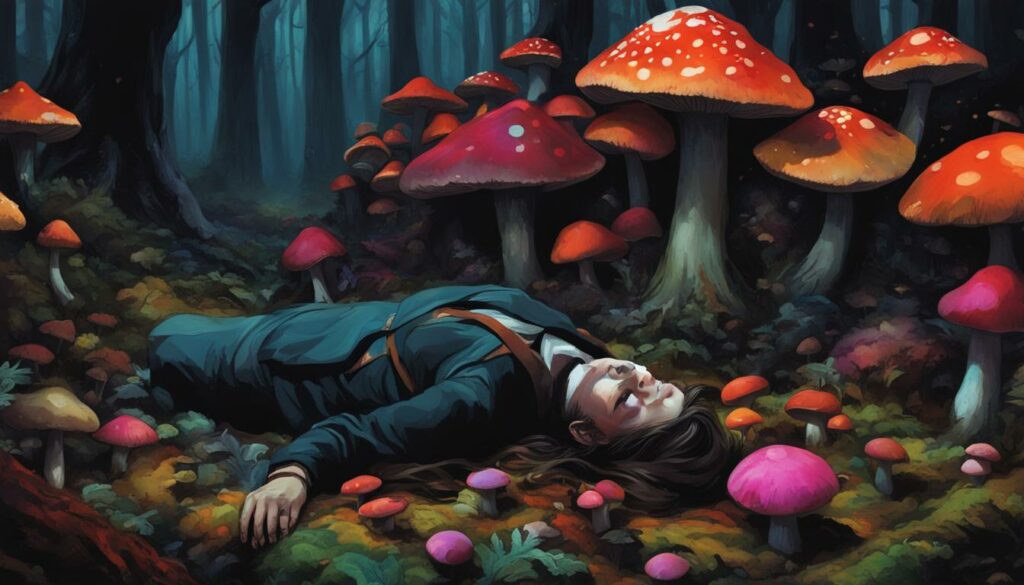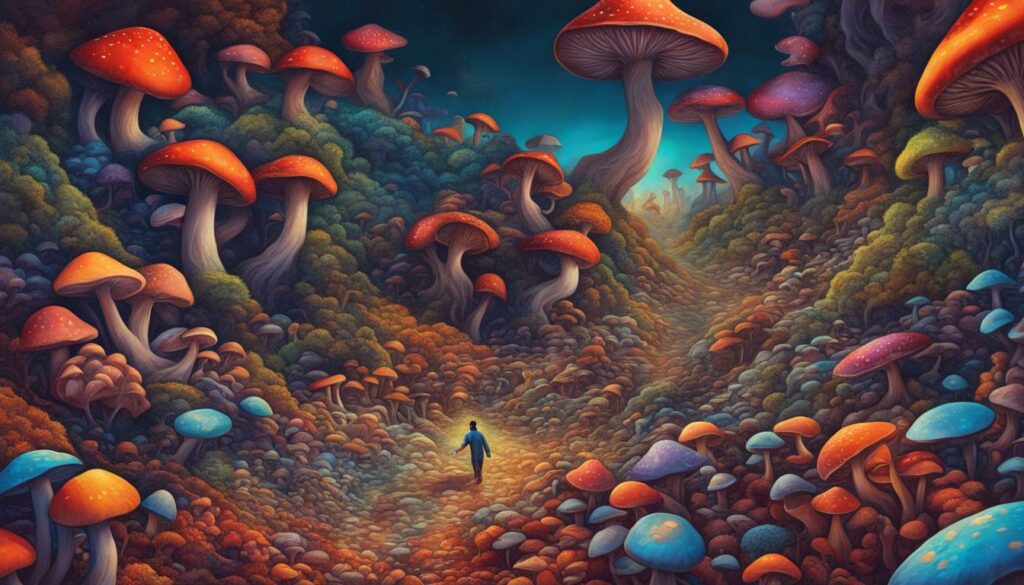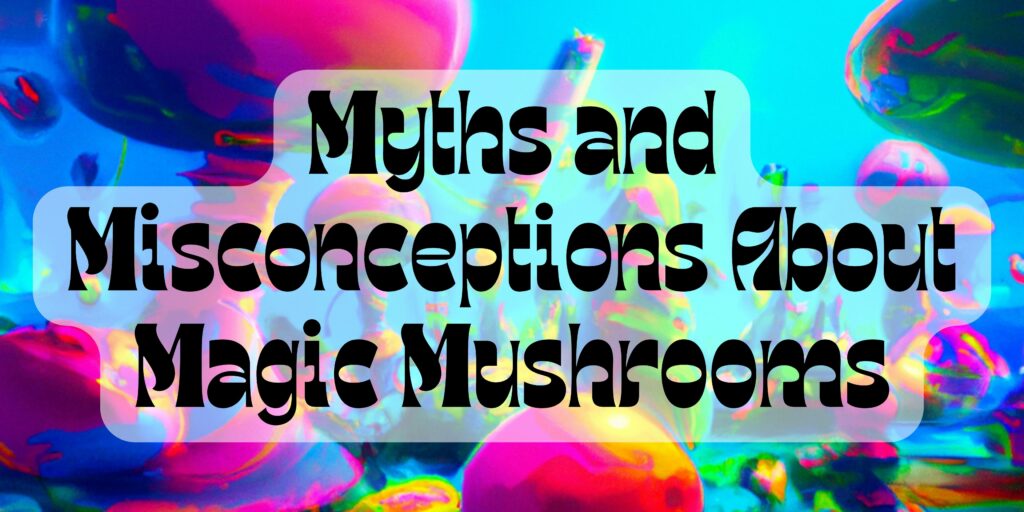Shrooms, also known as magic mushrooms or psilocybin mushrooms, have gained popularity for their hallucinogenic effects. However, it is essential to understand the risks associated with shrooms overdose. While physical overdose is unlikely, taking too many mushrooms or a potent batch can lead to severe psychological symptoms. In this article, we will explore the signs, effects, and prevention of shrooms overdose.
When it comes to shrooms overdose, it is crucial to be aware of the symptoms and complications that can arise. Identifying these signs can help prevent and address overdose incidents effectively. In cases of shrooms overdose, seeking immediate medical attention is vital to ensure the well-being of the affected individual.
Key Takeaways:
- Shrooms, or psilocybin mushrooms, contain a chemical called psilocybin that produces hallucinogenic effects.
- Physical overdose is unlikely, but consuming too many mushrooms or a potent batch can lead to severe psychological symptoms.
- Signs of shrooms overdose can include panic attacks, intense trips, paranoia, delusional thinking, and even psychosis.
- Immediate medical attention should be sought if severe symptoms or accidental ingestion of poisonous mushrooms occur.
- Treatment for shrooms overdose focuses on managing symptoms and providing a safe, supportive environment.
Common Signs and Effects of Mushroom Use
Using mushrooms can result in various signs and effects, both positive and negative. It is important to be aware of these effects to prevent and address shrooms overdose. Here are some of the common signs and effects of mushroom use:
- Relaxation and Euphoria: Mushrooms can induce a sense of relaxation and euphoria, making users feel calm and happy.
- Distortion of Time: Time perception can become distorted, with minutes feeling like hours or hours feeling like minutes.
- Mood Swings: Users may experience rapid changes in mood, swinging from joy to sadness or vice versa.
- Intense Introspection and Spiritual Experiences: Mushrooms can lead to deep self-reflection and profound spiritual experiences.
- Heightened Sensory Perception: Users may experience enhanced senses, with colors appearing more vibrant and sounds more vivid.
- Hallucinations: Visual and auditory hallucinations can occur, where users see and hear things that are not actually present.
- Synesthesia: Mushrooms can cause a blending of senses, resulting in phenomena like seeing sounds or tasting colors.
While these positive effects can be desirable for some individuals, it is important to note that mushrooms can also have negative side effects:
- Nausea and Vomiting: Many users experience gastrointestinal discomfort, including nausea and vomiting, especially during the onset of the trip.
- Anxiety, Panic, or Paranoia: Mushrooms can induce feelings of anxiety, panic, or paranoia, which can be particularly distressing for some individuals.
- Muscle Weakness and Poor Coordination: Physical coordination may be impaired, leading to muscle weakness and difficulties with movement.
- Flashbacks: Some users may experience flashbacks, where they re-experience aspects of a previous mushroom trip without ingesting the drug again.
- “Bad Trips”: In some cases, mushroom use can result in a negative and overwhelming experience, known as a “bad trip”. This can involve intense fear, confusion, and distressing hallucinations.
It is crucial to understand the potential signs and effects of mushroom use to ensure responsible and safe consumption. Monitoring and managing these effects can help individuals minimize risks and prevent potential shrooms overdose.
| Signs and Effects of Mushroom Use | Positive Effects | Negative Effects |
|---|---|---|
| Relaxation and Euphoria | ✓ | |
| Distortion of Time | ✓ | |
| Mood Swings | ✓ | |
| Intense Introspection and Spiritual Experiences | ✓ | |
| Heightened Sensory Perception | ✓ | |
| Hallucinations | ✓ | |
| Synesthesia | ✓ | |
| Nausea and Vomiting | ✓ | |
| Anxiety, Panic, or Paranoia | ✓ | |
| Muscle Weakness and Poor Coordination | ✓ | |
| Flashbacks | ✓ | |
| “Bad Trips” | ✓ |
Typical Overdose Symptoms and Risks
While physical overdose from shrooms is unlikely, it is important to be aware of the typical symptoms and risks associated with consuming too many mushrooms or a highly potent batch. The effects of a shrooms overdose are primarily psychological and can be quite severe. Individuals who have taken too many mushrooms may experience intense panic attacks, extended “trip” experiences, loss of control, extreme paranoia, delusional thinking, and even psychosis. In rare cases, a shrooms overdose can lead to complete psychological collapse.
The risk of a shrooms overdose is increased when consuming very large doses or if there is a personal or family history of mental illness. It is important to note that shrooms overdose symptoms are different from mushroom poisoning. Misidentification of poisonous mushrooms can lead to organ damage or even death. It is crucial to be able to differentiate between psilocybin mushrooms and toxic varieties to avoid such complications.
To summarize, while physical overdose from shrooms is unlikely, a shrooms overdose can have severe psychological effects. It is important to be aware of the typical symptoms and risks associated with consuming too many mushrooms or poisonous varieties. Misidentification of toxic mushrooms can lead to organ damage or death. Understanding the signs of a shrooms overdose is crucial for prompt intervention and appropriate medical attention.
Treatment for Shrooms Overdose
When it comes to treating a shrooms overdose, immediate medical attention is crucial. The goal is to manage the symptoms and provide a safe, supportive environment for the individual. The specific treatment approach may vary depending on the severity of the overdose and the symptoms exhibited.
In some cases, medical professionals may choose to pump the stomach or administer activated charcoal to limit the absorption of the psilocybin. This can help reduce the effects of the overdose. Benzodiazepine sedatives may also be used to help calm the individual and manage any anxiety or panic they may be experiencing.
It’s important to note that there are currently no medications specifically designed for treating shrooms addiction. However, follow-up substance abuse treatment may be recommended to address any underlying issues and provide support for long-term recovery.
| Treatment for Shrooms Overdose | Description |
|---|---|
| Pumping the stomach | A medical procedure to remove the contents of the stomach in order to limit the absorption of psilocybin. |
| Activated charcoal | A substance that can help absorb psilocybin in the stomach, reducing its effects. |
| Benzodiazepine sedatives | Medications that can help calm the individual and manage any anxiety or panic associated with the overdose. |
| Follow-up substance abuse treatment | Rehabilitation programs and support services that can help address any underlying issues and provide long-term recovery support. |
Overall, proper treatment for shrooms overdose focuses on addressing the immediate symptoms and providing the necessary support for individuals to recover safely. Seeking medical attention as soon as possible is essential, and following up with appropriate substance abuse treatment can greatly contribute to the individual’s overall well-being.
Risks and Other Health Concerns
While the physical overdose of shrooms is unlikely to be fatal, there are several risks and health concerns associated with their use. One major risk is the potential consumption of poisonous mushrooms by mistake. Toxic mushrooms can resemble psilocybin mushrooms and can cause organ damage or even death. Symptoms of mushroom poisoning include abdominal pain, muscle pain, mucus in the lungs, slow heart rate, excessive sweating, muscle spasms, low blood sugar, and kidney failure.
Another risk is the consumption of mushrooms that have been laced with other substances, such as LSD or PCP. This can lead to unpredictable and potentially dangerous effects. It is important to source mushrooms from trusted and reputable suppliers to minimize the risk of contamination or adulteration.
Long-term use of hallucinogens, including shrooms, can also have adverse effects on mental health. Prolonged use may lead to persistent psychosis or a condition known as hallucinogen persisting perception disorder (HPPD). HPPD is characterized by the reoccurrence of hallucinations or perceptual disturbances even after the drug has left the system. Other mental health issues, such as anxiety and depression, may also be associated with long-term hallucinogen use.
| Risks and Health Concerns | Description |
|---|---|
| Poisonous Mushroom Consumption | Accidental ingestion of toxic mushrooms can cause organ damage or death. |
| Contamination or Adulteration | Mushrooms laced with other substances can lead to unpredictable and dangerous effects. |
| Hallucinogen Persisting Perception Disorder (HPPD) | Reoccurrence of hallucinations or perceptual disturbances even after drug use has ceased. |
| Mental Health Issues | Anxiety, depression, and other mental health problems may be associated with long-term hallucinogen use. |
“Consuming poisonous mushrooms can have severe consequences and should never be taken lightly. It is crucial to correctly identify and source mushrooms from trusted suppliers to avoid any potential health risks.” – Dr. Emily Thompson, PsyD
Note: Always consult a healthcare professional for accurate and personalized advice regarding drug use and potential risks.

Conclusion
Understanding the signs, effects, and prevention of shrooms overdose is crucial for responsible use. Although physical overdose is unlikely to be fatal, it can lead to severe psychological symptoms that should be taken seriously. By being aware of the signs and effects of shrooms use, individuals can better prevent overdose and minimize potential risks.
If someone experiences overdose symptoms or the symptoms worsen, seeking immediate medical attention is essential. Medical professionals can provide the necessary treatment to manage symptoms and create a safe environment for recovery. It is important to remember that there are currently no specific medications for treating shrooms addiction, but follow-up substance abuse treatment may be recommended in some cases.
Statistics show that emergency medical treatment for shrooms overdose is relatively low compared to other drugs. This highlights the importance of responsible use and prevention. By using mushrooms responsibly, being cautious to avoid consuming poisonous mushrooms, and seeking help when needed, individuals can minimize the risks associated with shrooms overdose and ensure a safer experience.
FAQ
What are the signs of shrooms overdose?
Signs of shrooms overdose can include panic attacks, intense trips, paranoia, delusional thinking, and even psychosis.
What are the effects of shrooms overdose?
Shrooms overdose can cause severe psychological symptoms such as panic attacks, intense trips, paranoia, delusional thinking, and even psychosis.
How can I prevent shrooms overdose?
To prevent shrooms overdose, it is important to be aware of the signs and effects, use mushrooms responsibly, and avoid accidental ingestion of poisonous mushrooms.
What should I do if someone experiences shrooms overdose symptoms?
If someone experiences shrooms overdose symptoms or the symptoms worsen, immediate medical attention should be sought.
What is the treatment for shrooms overdose?
Treatment for shrooms overdose focuses on managing symptoms and providing a safe, supportive environment.
Are there any long-term complications of shrooms overdose?
Long-term complications of shrooms overdose can include persistent psychosis or flashbacks.
Can shrooms overdose be fatal?
While physical overdose from shrooms is unlikely to be fatal, it can lead to severe psychological symptoms and should be taken seriously.
What are the risks of consuming poisonous mushrooms?
Consuming poisonous mushrooms can cause organ damage or death.
Can shrooms be laced with other substances?
Yes, shrooms can be laced with other substances like LSD or PCP.
Is there follow-up treatment for shrooms overdose?
Follow-up substance abuse treatment may be recommended, but there are currently no medications specifically for treating shrooms addiction.




